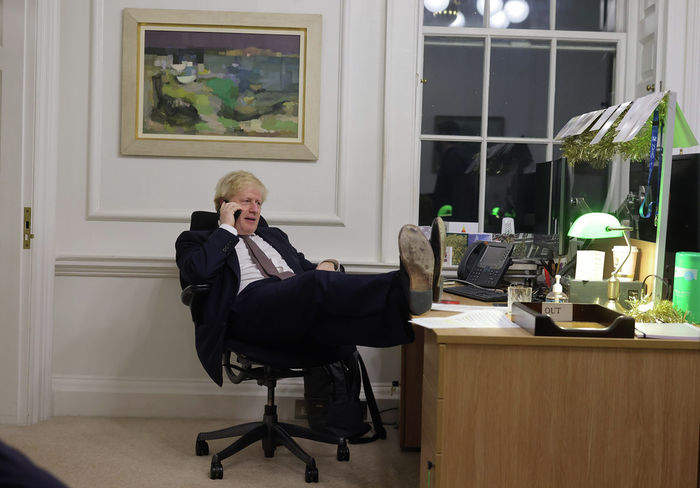The Conservative Party’s demographic time bomb
Megan Byrom argues that the Conservative Party is neglecting its next generation of voters

I’m sitting in the Union, taking full advantage of their “open week”. Today is the day of their mock PMQs. The leaders of each university association take turns interrogating the Cambridge University Conservative Association’s (CUCA) chairman, who stands unrelenting before the whoops and jeers from the opposition benches. For these young Conservatives, it is all white noise. They remain confident in the awareness that outside of these doors, it is their party that holds the real power in Westminster.
Yet in this chamber, the Conservative Party should take note. As students filed into benches on the opposing sides, the balance tipped firmly to the left, quickly making the hall a reflection of a growing electoral trend: young people aren’t voting Conservative.
It’s true that the British electorate has been in flux for some time. Gone are the once rigid expectations of class, income, or region, replaced by 21st-century elections that have done away with these traditional precursors of voting behaviour. With the Tories taking on the “red wall”, and Labour making strides with urban city dwellers and the university-educated, our parliamentary parties’ voter bases are shifting, perhaps irreversibly.
With these transitions taking place at every ballot box across the country, one factor is emerging as a consistent indicator: age.
“18-to-25-year-olds were twice as likely to vote remain than the over-65s”
From the Brexit referendum to the most recent parliamentary election, this voter divide continues to unveil itself. In the 2019 General Election, as reported by YouGov, 56% of 18-to-24-year-olds voted Labour, falling slightly to 46% for the 30-39 age groups. This division mirrors that of the earlier Brexit referendum, when 18-to-25-year-olds were twice as likely to vote remain than the over-65s.
The current Conservative Party, with their healthy majority in Parliament, seem undisturbed by such statistics. Demographically, Conservative voters tend to be older, wealthier homeowners, and it is this group that has continually supported the party through successive elections.
But with these generations entering the later part of their life, the Conservative Party must reexamine their current voter base if they wish to sustain their political project, and find the answers to the increasingly pressing question of how to get young voters on their side.
With increases in national insurance set to impact young workers disproportionately and plans to decrease student loan payment thresholds in circulation, is this reexamination happening at all?
There are lots of reasons why young people may be more left-leaning. Culturally, this generation is more diverse than any population of young Britons that has come before. They are statistically better educated, with Blair’s decision to send a whole new generation up the ladder of social mobility to higher education reaping rewards for the Labour Party to this day. Their opinion on conservative politics and free-market capitalism is marred by the financial crash of 2008, and the second global challenge presented by Covid.
“For a party rooted in the ideology of conservation, this generation has nothing to conserve”
Perhaps most important, though, is that for a party rooted in the ideology of conservation, this generation has nothing to conserve. Home and asset ownership among under-40s is low. Twinned with employment precarity, “generation rent” and infrastructure inequality, the ideology of the Conservative Party seems a world away from the reality of these young people. Instead of baiting young people with policies that deal directly with these issues, the Conservatives seem to be allowing them to turn away in droves.
Whilst the “culture divide” is a superficial idea and doesn’t encapsulate the reality of the British public, for the Conservative Party, feeding into a vision of cosmopolitan young urban graduates as the antagonist of the hard-working, semi-rural Englishman is a politically effective strategy. Young people do play a role in this divide. Without trying to, their cultural differences and higher levels of education prove the Conservative rhetoric about “left behind towns” and Labour “wokeness”.
Perhaps the party is waiting to harvest the large group of young people who currently do not vote, but one day will. With the Conservatives’ support growing in lower-educated seats, targeting non-graduates in semi-rural Britain may play well into this British culture divide. Whilst they are statistically not voting now, the party may be waiting out this electoral challenge in the hope that this section of young people doesn’t just show up to vote, but also grows more conservative with age.
The Conservatives’ strategy towards young people isn’t clear, and whether it exists at all remains to be answered. However, if the Tories cannot get more Millennials and Gen-Z on their side, the party must ready itself to deal with a demographic time bomb that will soon be ready to implode.
 Features / Are you more yourself at Cambridge or away from it? 27 January 2026
Features / Are you more yourself at Cambridge or away from it? 27 January 2026 Interviews / Lord Leggatt on becoming a Supreme Court Justice21 January 2026
Interviews / Lord Leggatt on becoming a Supreme Court Justice21 January 2026 News / Reform candidate retracts claim of being Cambridge alum 26 January 2026
News / Reform candidate retracts claim of being Cambridge alum 26 January 2026 News / Vigil held for tenth anniversary of PhD student’s death28 January 2026
News / Vigil held for tenth anniversary of PhD student’s death28 January 2026 Comment / How Cambridge Made Me Lose My Faith26 January 2026
Comment / How Cambridge Made Me Lose My Faith26 January 2026











